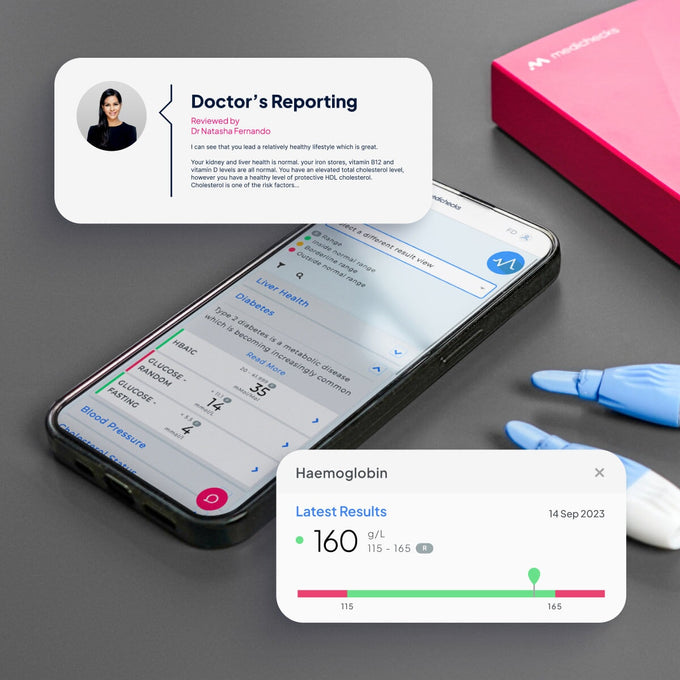6-in-1 STI Blood and Urine Test, from our experts to you.
Dr Sam Rodgers MBBS, MRCGPChief Medical Officer

What can I learn from this test?
Our blood and urine test checks whether you have chlamydia, gonorrhoea, HIV, syphilis, hepatitis B, or trichomoniasis.
Since many STIs don’t cause symptoms, an STI test is the only way to know whether you have an infection. An untreated STI can lead to medical problems or be spread to others, so it’s important to get checked regularly. This is especially true if you have had unprotected sex, sex with someone whose medical history is unknown to you, or if you’re changing sexual partners.
What are chlamydia, gonorrhoea, and syphilis?
Chlamydia, gonorrhoea, and syphilis are all bacteria that can be spread through direct sexual contact.
Chlamydia is caused by the bacterium Chlamydia trachomatis. It often doesn’t cause any symptoms but can spread to the womb or fallopian tubes and affect fertility if left untreated.
Gonorrhoea is caused by the bacterium Neisseria gonorrhoea. Gonorrhoea can cause discoloured or foul-smelling discharge from the vagina or penis, or a burning sensation when urinating. Up to half of women and one in ten men don’t develop symptoms.
Syphilis progresses in stages with different symptoms, though some of these may be mild. Symptoms include sores and skin growths around the genitals and anus, a blotchy rash, joint pain, and fevers. Without treatment, syphilis can damage vital organs such as the brain, heart, nerves, liver, and bones.
What are HIV, hepatitis B, and trichomoniasis?
HIV and hepatitis B are both blood-borne viruses, while trichomoniasis is a parasite.
HIV stands for human immunodeficiency virus and lives in the bodily fluids, including semen, vaginal fluid, and blood. It is most commonly transmitted through unprotected sex with an infected partner. HIV damages your immune system making it harder to fight infections and diseases. There is no cure for HIV, but current treatments can reduce viral loads to undetectable levels.
The hepatitis B virus often causes no symptoms, and many people recover from infection without treatment. However, it’s possible to develop a chronic infection, which can cause permanent liver scarring and cancer. Symptoms of hepatitis B include nausea, diarrhoea, abdominal pain, and flu-like symptoms.
Trichomoniasis is caused by a parasite that infects the vagina and urethra (the tube that passes urine). Most people infected by trichomoniasis have no symptoms. However, symptoms may include discharge from the vagina or penis, itching or soreness in the genital areas, and pain when urinating. Having a trichomonas infection increases the risk of getting other STIs.
Limitations of the test
What's Included?
How to prepare for your test
Special Instructions
Prepare for your 6-in-1 STI Blood and Urine Test by following these instructions. If there is a chance that you’ve been exposed to HIV, hepatitis B or C, please let us know how long before taking your sample this occurred. Your sample should be taken at least four weeks after possible exposure to hepatitis B or HIV. A repeat HIV test is recommended at 12 weeks. Do not take biotin supplements for two days before this test, discuss this with your doctor if it is prescribed.
Frequently asked questions
How accurate is the 6-in-1 STI Blood and Urine Test?
Provided you take your samples correctly and at the right time after exposure, our STI check is very accurate. The test will pick up an infection in 95% of cases of gonorrhoea, over 97% of cases of chlamydia, and almost all cases of syphilis and trichomoniasis. The test will detect almost all (99.9% or more) cases of HIV and hepatitis B. Our test’s ability to accurately detect STIs (true-positive results) is known as its sensitivity.
If you have no STIs, the test will almost always (in 99% of cases or more) accurately give a negative result. A test’s ability to accurately detect true-negative results is known as its specificity.
Clinical sensitivity and specificity data for each test are provided in the table below, based on studies carried out by the assay manufacturers.
| Sensitivity (%) | Specificity (%) | |
| Chalamydia | 97.14 | 99.6 |
| Gonorrhoea | 95 | 99.89 |
| Syphilis | 100 | 100 |
| Trichomoniasis | 100 | 99.68 |
| HIV | 100 | 99.87-99.92 |
| Hepatitis B | 99.9 | 99.88-99.98 |
Please note that no test is 100% accurate. Though very rare, it’s possible to receive a false-positive or false-negative result.
When should I visit a sexual health clinic?
You should visit a sexual health clinic if:
-You have symptoms of an STI
-One of your sexual partners has an STI
-You’re worried after having unprotected sex
What are the symptoms of an STI?
The symptoms of an STI are wide-ranging and depend on the type of infection. We recommend attending your local sexual health clinic if you’re sexually active and experience any of the following symptoms:
-Sores, bumps, or skin growths on the genitals or anus
-Pain or a burning sensation when urinating
-Unusual discharge from the vagina, penis, or anus
-Pain during sex
-A genital rash
-Itchy genitals or anus
-Unusual vaginal bleeding
Note that many STIs have no symptoms at all. That’s why it’s important to get tested regularly, especially if you have multiple partners or have unprotected sex.
How soon after sex should I take my test?
Some infections take some time before they can be detected by a blood or urine test. This is known as an incubation period.
Generally, it’s best to wait:
-Two weeks after your last sexual encounter for chlamydia and gonorrhoea
-Four weeks after your last sexual encounter for syphilis and HIV (though you may need a repeat HIV test at 12 weeks)
While you can take an STI test straight away after your last sexual encounter, you’ll need to re-test after these time periods to be sure you don’t have an infection.
If you have symptoms of an STI, it’s important to attend a sexual health clinic as soon as you can. Delaying treatment may cause complications and put you at risk of spreading the infection to others.
What happens if I get a positive result?
If any of your results are positive, our doctors will phone you to discuss the appropriate next steps. We’ll also advise you to contact any recent sexual partners.
We do not provide treatment for STIs. Instead, we will signpost you to the appropriate services for treatment.
How can I reduce my risk of getting an STI?
If you’re sexually active, practising safe sex is the best way to prevent an STI.
Tips for safer sex:
-Wear a condom for vaginal, anal, and oral sex
-Reduce your number of sexual partners
-Get vaccinated against certain infections (for example, human papillomavirus (HPV) and hepatitis A and B)
-Avoid having sex while under the influence of alcohol or recreational drugs
-Get tested regularly
How frequently should I get an STI test?
How often you need an STI test will depend on how often you’re having sex.
You should get an STI test:
-As soon as possible if you develop symptoms of an STI (at a sexual health clinic)
-At least every three months if you have lots of sexual partners
-At least every six months if you don’t have a regular partner and you have casual sex
-At the start of a new relationship, especially if you’re thinking about not using condoms



